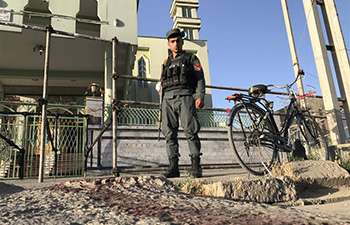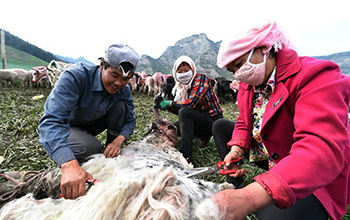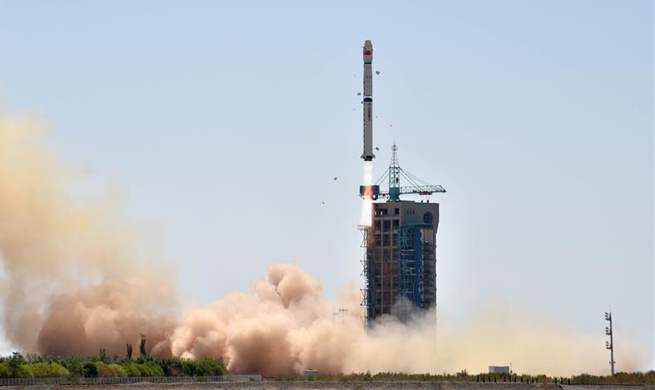By Burak Akinci
ANKARA, June 16 (Xinhua) -- Fresh data shows that the fragile Turkish economy is recovering faster than expected, but the country needs much structural reforms in order to stay on this track, according to local analysts.
Turkish economic growth unexpectedly accelerated at the beginning of the year to its best place in almost two years.
According to official data published on Monday, GDP growth in Turkey hit 5 percent in the first three months of the year compared to the same period last year, and up from 3.5 percent at the end of 2016, when the economy bounced back after its worst quarter and was technically entering a crisis.
Exports of goods and services rose by 10,6 percent. The overall growth for Turkey is established at 2.9 percent.
Some experts comment that this seems, partially to be a result of the weaknesses of the Turkish currency, the Lira, which lost more than 20 percent against the U.S. dollar over the past year.
Hit by a failed coup last summer, the Turkish regime led by President Recep Tayyip Erdogan went head on to organize a crucial constitutional reform in April that granted the dominant president sweeping powers, primary in order to manage the economic crisis.
Ankara opened the tap for companies and introduced tax facilities and debt relief for those whole were under hardship. It also established a sovereign fund, designed in general to manage the crisis amid the state of emergency declared after the coup attempt.
According to President Erdogan, 2017 could be "the year of a historical leap" for the Turkish economy.
"The rally at the stock exchange and the fall in foreign exchange rates are signs of the markets' full confidence in the economy," he said on June 3 while speaking at the general assembly of a business association.
Urging the business community to resume investments, he added, "Now it's time to act. Don't be late. Seizing investment opportunities in times like this would yield greater gains. Using all your means and courage to invest, produce, export and expand employment."
Starting from September 2016, international credit rating agencies have cut Turkey to non-investment grade. Still, Turkey managed to lure a new flow of short-term investments from abroad, which halted the rise of the dollar and even pushed it back. As a result, domestic demand and even exports perked up, stimulating growth.
"What is important for Turkey, is primarily to ensure a sustainable growth. What would be ideal for Turkey is to be integrated linked to production and exports," indicated to Xinhua international finance expert, Never Erkan, from Istanbul's KapitalFX.
"The main element of a sustainable growth model is to guarantee a climate of confidence. And to do so, fundamentally what is needed is to engage in structural reforms in the economy field," said the expert.
The main stimulant of the new growth momentum came from the big incentives the government offered to the private sector, including more than 180 billion Turkish liras (50.7 billion USD) in loans issued under the Credit Guarantee Fund, a measure that reduced stress both in the real estate sector and on the banking front. Another notable factor was the relative easing of political uncertainty after the April 16 constitutional referendum.
The revival in exports has also begun to contribute to growth. According to Economy Minister Nihat Zeybekci's estimate, exports contributed 1.5 points to the growth rate in the first quarter.
But rumours after President Erdogan returned at the helm of the ruling Justice and Developpement Party (AKP), one of the controversial points of the referendum, that a cabinet reshuffle was close, especially changing the economic team did not materialize. This has yet to be put into practice in order to give a fresh momentum to economy, according to experts.
Yet there is also the other side of the coin, where two top fragilities are emerging: unemployment and inflation. The unemployment reached nearly 13% in February but dropped 1 point in March, to 11.7%, according to date released on Thursday and inflation hit some 12%.
Experts are on the same page about the need for structural reforms such as "technological innovations and branding."
"What Turkey needs in order to boost its potential is a production oriented growth. We need to innovate, to create our own brands. It's regrettable that Turkey has not been capable of producing it's own brand of portable phone, for example," said to Xinhua economist and strategist Yeliz Karabulut.
"Turkey needs to produce herself the machines that she is buying from other countries," she added with a positive perspective for this year after what she called a "year of turbulence."
Ankara started a campaign in late February to boost employment by giving a further push to investment and production, a program that seemingly proved itself, as fresh data shows.
But more hard work is needed, as statements from government officials indicates.
"We have to cut the unemployment rate back to single digit again (...) We have two strengths: Turkey has a young population which leads to high dynamism and our other advantage is the geographical position of our country, located in the middle of global markets," said recently Prime Minister Binali Yildirim.
"It's clear that the Turkish economy has a great potential, no matter a coup attempts and geo-strategic problems," insisted professor Levent Yilmaz from the Institute of Strategic Thinking (SDE).
"Although having some structural problems as all emerging markets, Turkish economy deserves an upstage by credit rating agencies," he pointed out.

















